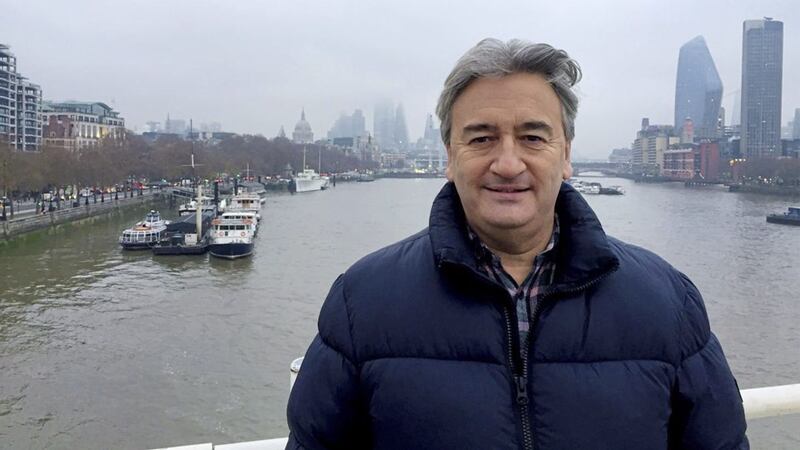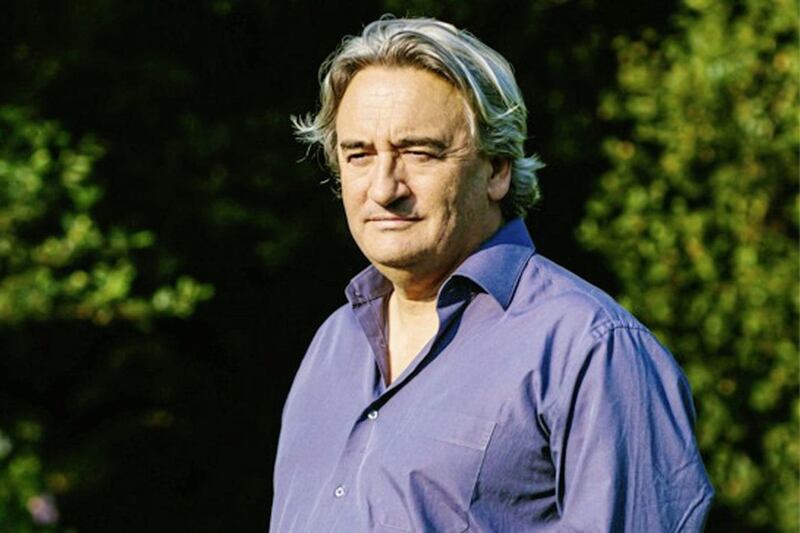“I HAVE a voice, too, and for good or evil mine is the speech that cannot be silenced.”
I thought of this line from Joseph Conrad’s African novella Heart of Darkness as I prepared to talk to Fergal Keane, one of Ireland’s most respected journalists, about his work at home, in Britain and across the world, especially his groundbreaking work in Africa.
A year ago the BBC announced that Keane would be standing down from his post as the corporation's Africa editor due to the post traumatic stress disorder he had been suffering for a number of years. It was understandable to anyone who recalled the Dubliner's reports from the living hell that was Rwanda during the genocide there, in which some 800,000 men, women and children were slaughtered in the space of 100 days in 1994.
I was therefore going to be very sensitive in my approach, but when I messaged him he told me he was “on standby to film in an ICU” while working the Covid story for this employee of many years, the BBC.
There is probably no better person than Keane to cover the pandemic because he has a moral compass that isn’t always seen in the reporting of his peers (my words, not his).
This possibly goes back to his first job – as a reporter for the Limerick Leader.
“I spent three years in Limerick and it was fantastic,” he says. “When you’re a local newspaper reporter, you walk out on to the streets and you meet the people you are reporting about so you have to get it right.
“I also think you have to develop a level of care about people, the way you treat them and the way you deal with them because mostly it’s the right thing to do but also you’re very quickly reminded of it if you don’t.”
However, the young Keane wanted more than reporting on a domestic in Ardnacrusha or a hurling match in Patrickswell. He always wanted to see the world and to see how it worked, not solely because of his calling to be a reporter but because of all the books, especially history books, he read as a child and as young man. But the first job he got was as an RTÉ reporter in the north.
“As a young reporter, where else would you want to be if you wanted to understand history, if you wanted to understand why people feel such a degree of fear of 'the other' or had such an attachment to an ideal that they were willing to kill?”
While reporting from Belfast, Keane also reported from Africa in the early 1980s and in August 1990 he was appointed the BBC’s Southern African Correspondent. If reporting on the Troubles was traumatic, the experience of post-colonial Africa was deeper again.
Would Keane follow the well-travelled route of reporting on wild animals, war and famine, the sum total of what we have been told about 'the dark continent'?
“Well, the thing about wild animals is that it’s great but it’s presented as a colonial experience,” Fergal explains. “But what about the human factors in the story of conservation which until recently was totally ignored?
“What did it mean to people of the World Wildlife Fund [with its panda logo] who were trying to protect animals but at the same time were supporting the use of anti-poaching guards who were torturing and killing people? These things just didn’t feature on our radar until fairly recently.”
He’s right when he says the reporting of Africa from the 50s and 60s came with a certain set of assumptions.
“The idea was that Africa was wild and chaotic and violent for reasons we westerners couldn’t quite understand or, in truth, for reasons we didn’t take the time to understand,” says Keane.
“Secondly, that we were the people who came in with our superior knowledge and our superior values and we told the stories of these strange, wild, violent people to a western audience. 'Chino-man.' I know – I was that guy in the blue shirt and the chinos,” he laughs.
“But more seriously we were conveying the horror but not doing enough to convey understanding.”
And Keane had seen a lot of horror, in Bosnia as well as in Africa, but he says the post traumatic stress disorder has its roots nearer home.
“I think where it began was in Belfast in the 1980s but by the time I get to Rwanda it gets much worse,” explains the multi-award-winning journalist. “We were witnessing things there that no-one could have prepared us for."
People ask Keane if he became numbed to what was going on around him, he says, "but the truth is that the opposite happens – in my case anyway – and each experience just became more and more intense".
“I was trying to work out how people could actually do these things to teach other, even after you know the historical or the political reasons behind it," he says.
"There was a dimension as a human being looking at other human beings doing horrendous things to each other, whether it was in Belfast or Bosnia or Rwanda or Kosovo or Iraq, the cumulative effect of that – you can’t do it for 25 years, on top of the sniper fire that is going on over your head or the explosions. It’s all very, very wearying.
“And it catches you by surprise, it’s suddenly there, it ambushes you and then it keeps happening, it keeps coming back to you."
Of course, while we are discussing this, the obvious comparison swirls around in my head: Ireland.
When we spoke, Keane had just finished a three-part series called How the Irish Shaped Britain and I put it to him that the English or the British have never understood Ireland. They are beguiled by our humour and our blarney but at the same time they despise us for killing their sons and daughters, oblivious to the bloodstained history of their empire.
We literally built their country, contributed to their wealth, died in our thousands on their battlefields and yet they hardly know us. Undoubtedly How The Irish Shaped Britain will go some way to redressing that.
“Culturally, the impact of the Irish [on Britain] has been massive,” says Keane, who was himself born in London and grew up in Dublin and Cork. "From the early Irish language and art down to Yeats, Shaw, Shane MacGowan and Elvis Costello.
“Then you have the physical side where the Irish built reservoirs, roads, railways and housing estates, rebuilding Britain after the Second World War. Now their descendants are the people who run construction. Sean Mulryan, for example, who saw nine members of a neighbouring family move to London as labourers and now he is one of the biggest construction magnates in the country.”
Not everything is rosy, though. Keane rightly reminds us that the Irish played a huge role in the furtherance of the British Empire.
“They couldn’t have done it were it not for the Irish in the British army or in the civil service. Some might be horrified to hear that the officer responsible for the Amritsar massacre in India was Sir Michael O’Dwyer, a Catholic from Tipperary.”
You can listen to the first two episodes of How The Irish Shaped Britain on BBC Sounds; the third programme in the series airs on Monday on BBC Radio 4 at 8pm.






